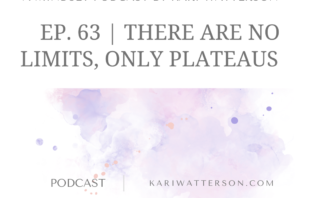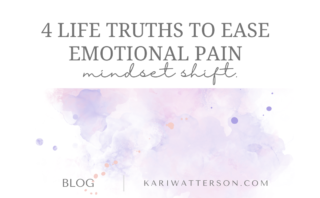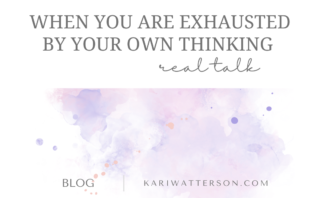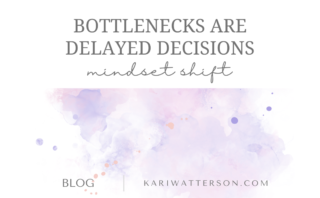I started off with a simple goal: to build my self-trust, one small step at a time. But I ended up with so much more.
……….
I started this year with a commitment to learning how to build my self trust, one small step at a time.
To me, self-trust meant trusting I would do what I said I would do; trusting I would honor my word to myself.
After a lifetime of struggling with incredibly low self-worth, I was convinced that if I could just learn to do what I said I would do, I would start to trust myself which would raise my esteem in my own eyes and I could finally stop carrying the shame of what I perceived to be my past failures because I was finally doing life the “right” and “responsible” way.
Looking back, I feel so much compassion and tenderness for the person who thought this was what she needed in order to start feeling worthy.
In many of the early episodes of my podcast, I talk about learning to trust myself. I laugh a bit now because those episodes also included a lot about my love/hate relationship with the habit tracker I used to monitor my progress (which I then used to assess my level of trustworthiness).
This was a lesson in itself — how, if we’re not careful, we can use the very tools that helped us grow so much to sabotage ourselves.
But my commitment to growth one small step at a time was everything.
And after almost 12 months, I realize I do trust myself, not because I marked X’s on a habit tracker, but because I did keep my word to myself, I did do what I said I would do, I did honor my word to myself in the most important of ways.
I committed to watching my negative self-talk, which led me to start treating myself with more kindness and tenderness.
I committed to asking myself what self-compassion would do in moments when my brain wanted to revert back to harsh self-judgment, self-loathing, shame, and compare and despair.
I committed to leaning into my insecurities and vulnerabilities around relationships and worked to dismantle past, traumatic stories that no longer served me. In moments of intense vulnerability when all I wanted to do was put my armor back on, I clung to Brené Brown’s teachings on strength in vulnerability and intentionally chose not to suit up.
Over and over again, I committed to choosing the path opposite of what I would’ve done in the past to give myself the chance to get to the other side, to the outcome I truly wanted.
I was very intentional about how I wanted my growth to look this year.
I was willing to tear down all my beliefs in order to start with a foundation of my own choosing, not based on past trauma, conditioned beliefs, societal norms, or my own limiting beliefs or fears.
Did it always feel good and positive?
Absolutely not.
This year was definitely packed with the full range of human emotions. Ironically, I had to develop the muscle of being present with and delighting in the moments of happiness just as much as I had to learn to lean into sitting with and processing fear, insecurity and vulnerability.
But, as cliché as it sounds, I’m grateful for all of it because it allowed me to do the innerwork I desperately needed to rebuild my self-concept.
Over the past 12 months I worked on:
- Radical self-responsibility (accepting 100% responsibility for my thoughts, feelings, actions, and results)
- Self-awareness
- Self-compassion (based on the work of Dr. Kristin Neff)
- Self-validation, self-acceptance, self-trust, self-worth
- Remembering that pain is not in the thing but in what I make the thing mean (and I get to choose what I make the thing mean)
- Dropping shame and harsh self-judgment
- Dropping or rewriting long-held narratives about my past
- Acknowledging and embracing my humanness
- Listening to and comforting my nervous system
- Slowing down and embracing more mindfulness
- Learning to identify, accept, feel, and process my emotions
- Making powerful decisions and having my own back
- Cultivating a growth mindset (based on the work of Dr. Carol Dweck)
- Starting before I was ready
- Learning to value imperfect action versus perfect, imaginary inaction
- Understanding the difference between massive action and passive action
- Reminding myself “hard” things are 100% easier with a managed mind, and since I’ve committed to managing my mind, I can 100% do hard things (and not die)
- Building my emotional intelligence and resilience
- Learning to set personal boundaries for my mental, emotional and physical health
- Learning how to be in close, meaningful relationships with others from a place of wholeness, abundance and love — without self-betraying
- Developing the ability to practice the pause before engaging, particularly when my nervous system is triggered
- Truly believing in the power and compound effect of one small step over time
- Understanding how our brains process thoughts and feelings (including the link between our primitive brain and our fear-based emotions) and using that knowledge to not only increase my ability to do things outside my comfort zone but to see the world and others through a more compassionate lens
- Understanding the brain science behind habit formation and using that knowledge to unlearn old habits and develop new habits, including old and new ways of thinking
- Visualizing and believing in the future I’m creating
- Learning to love and accept the person I was in the past, the person I am now, and the person I’m becoming
- Intentionally choosing over and over the energy I wanted to fuel my growth for long-term health and success (with self-compassion, curiosity, wonder, fun, commitment, and an abundance-driven, growth-mindset versus fear, insecurity, anxiety, pressure, and a scarcity-driven, fixed mindset)
- Learning to be proud of myself for all the things, big and small
- Loving and being excited for the growth on the way to a result versus focusing solely on the end result
- Practicing patience with myself as I continue to grow and learn, understanding that mindset work is a daily practice and one I will continue for the rest of my life
- Understanding that mindset work doesn’t mean I’ll never struggle or feel negative emotions; it means that when I do I trust in my willingness and ability to help myself through the difficult times
What started as a determined exercise in self-trust grew and blossomed into a wholeness of self and inner peace I’ve never had before.
This feeling of groundedness and self-assurance allowed me to do things I never thought possible:
- Go all in a mindset coaching practice
- Start a mindset and emotional wellness podcast (with 26 episodes to date)
- Help people throughout the country and in different parts of the world
- Allow myself to develop relationships and friendships without the pain of intense insecurity and anxious attachment
The most rewarding part of this journey has been witnessing the ripple effect of my own growth on my family, friends, and clients.
Watching others take courageous steps to explore a different way of thinking and being, rediscovering their own worth, loveability, and potential, easing their own emotional suffering, and starting to believe in hope and possibility again, has been nothing short of a privilege, one that I’m immensely grateful for.
If I’ve learned anything this past year — from my own growth work, talking with friends and family, and listening to and helping clients all over — it’s that much of our emotional suffering (our fears, insecurities, worries, anxieties, vulnerabilities) is universal…
…and self-created.
I say this knowing some will feel I’m invalidating their pain, as if I’m suggesting they’re to blame for their struggles.
As someone who spent a lifetime suffering from often debilitating depression and anxiety, I know this can feel like a slap in the face.
But the pain we suffer is often because we feel powerless to change and to live the lives we want. That the happiness, love, fulfillment, peace, and success we long for is available for others, but not us.
I remember those days well.
And I know life can feel unbearable through this lens.
But with courage, we can empower ourselves to change the lens through which we view our lives and the world.
It will require us to untether ourselves from the belief that someone else’s wrong-doings or behavior, or past circumstances, are responsible for our present and future happiness and success.
It will require a firm commitment to taking 100% ownership of our thoughts, feelings, actions, and results.
Some might say, “Wait, so others are off the hook for the pain and trauma they caused me?”
Accepting 100% responsibility for your thoughts, feelings, actions, and results, is actually the kindness gift you can give yourself.
It’s self-compassion and self-liberation in the truest form.
It means we stop depleting our mental and emotional bandwidth on things beyond our control (what happened in the past, others’ opinions of us, the political climate, the economy, family and professional dynamics, etc.) and focus our energy instead on the things within our power and control: our thoughts, feelings, actions, and results.
When we do this, we empower ourselves to create the change we desperately want. Whether through therapy, coaching, meditation, breathwork, mindset work, mindfulness practices, podcasts, etc., resources are available, if we’re willing to seek them out.
We don’t have to wait for anyone else or a specific turn of events to get the help we need to heal and move forward.
We spend so much of lives chasing goals or things, when what we’re truly chasing are feelings.
We can add up all the accolades and accomplishments, but at the end of the day, we’ll measure how we lived by the way we feel when we look back at our lives.
We want to feel like we truly lived, not just survived.
That’s why innerwork is the most important thing we can do for our present and future happiness.
And it starts with having the willingness and courage to first turn inward to work on healing, strengthening and deepening our relationship with ourselves.
Whoever said growth is not a linear process clearly understood what it takes to be in the arena.
And maybe that’s the greatest lesson yet:
In order to experience the growth of being in the arena, you must:
- Step into the arena;
- Commit to staying there; and
- Choose wisely the energy you use to fuel your growth and success.
I understand in my bones now why successful people urge others to just start.
I could never have known all that I would learn this year when I set my intentions back in January, but I’ll forever be grateful I let myself just start.
If you’re reading this and struggling, I see you.
I feel you.
I was you.
Just start, my friend.
Start where you are. Start with radical self-compassion. Seek help if you need it.
The arena is worth it.
— — — —
This post inspired Episode 27 of The End of the Day: A Mindset Podcast with Kari Watterson (available on Apple Podcasts, Spotify, Google Podcasts, Stitcher, and via KariWatterson.com).
— — — —
Partial List of Recommended Resources:
- Book: Atomic Habits by James Clear
- Book: The Power of Now by Eckhart Tolle
- Book: The Power of Vulnerability by Brené Brown, Ph.D.
- Book: Mindset by Carol Dweck, Ph.D.
- Book: Breaking the Habit of Being Yourself by Dr. Joe Dispenza
- Article: The Five Myths of Self-Compassion by Kristin Neff, Ph.D.
- Podcast: Tara Brach, Ph.D.
— — — —
Ever wonder if you might benefit from life coaching? Try a free 90-minute coaching call. Experience what it would be like to have weekly 1:1 coaching support for 6 months to a year while you actively do the work to change your life. Mindset + Habits + Identity Work.
Click here to book your free call this week.




